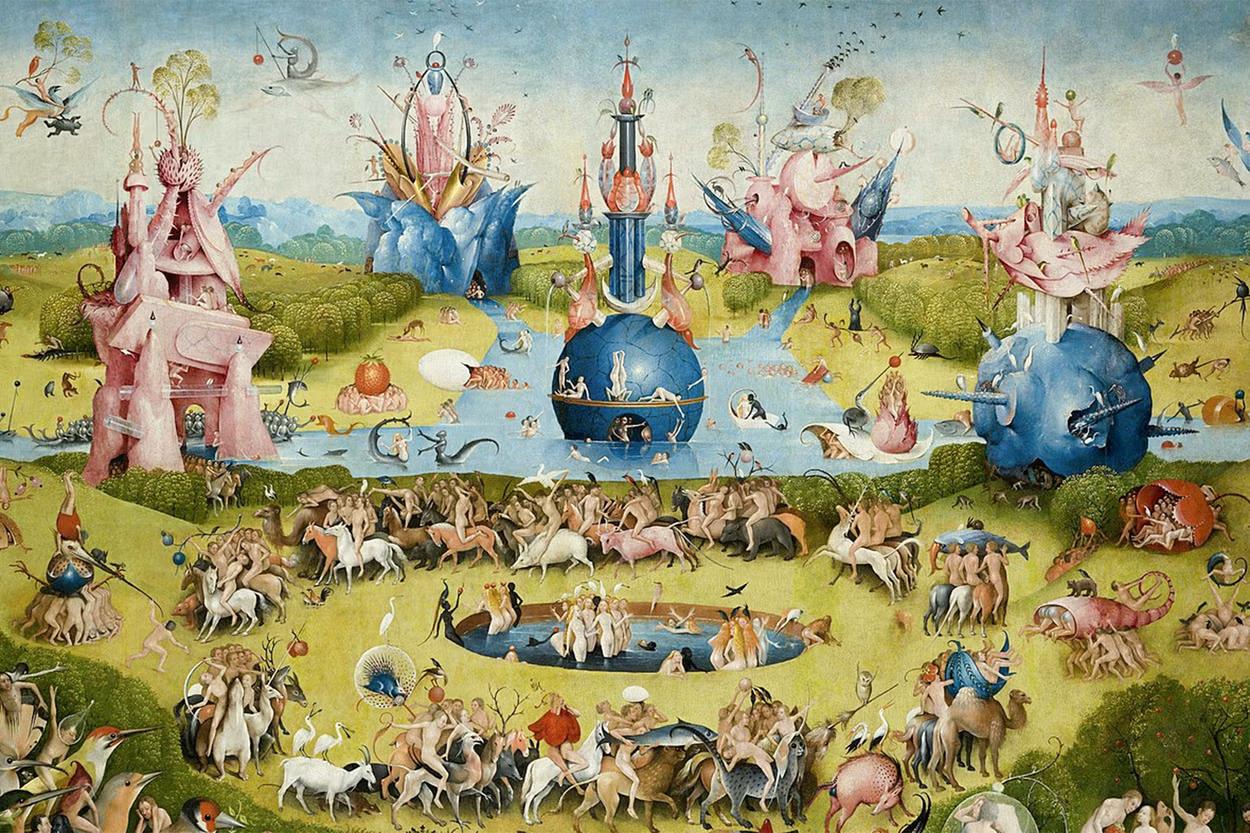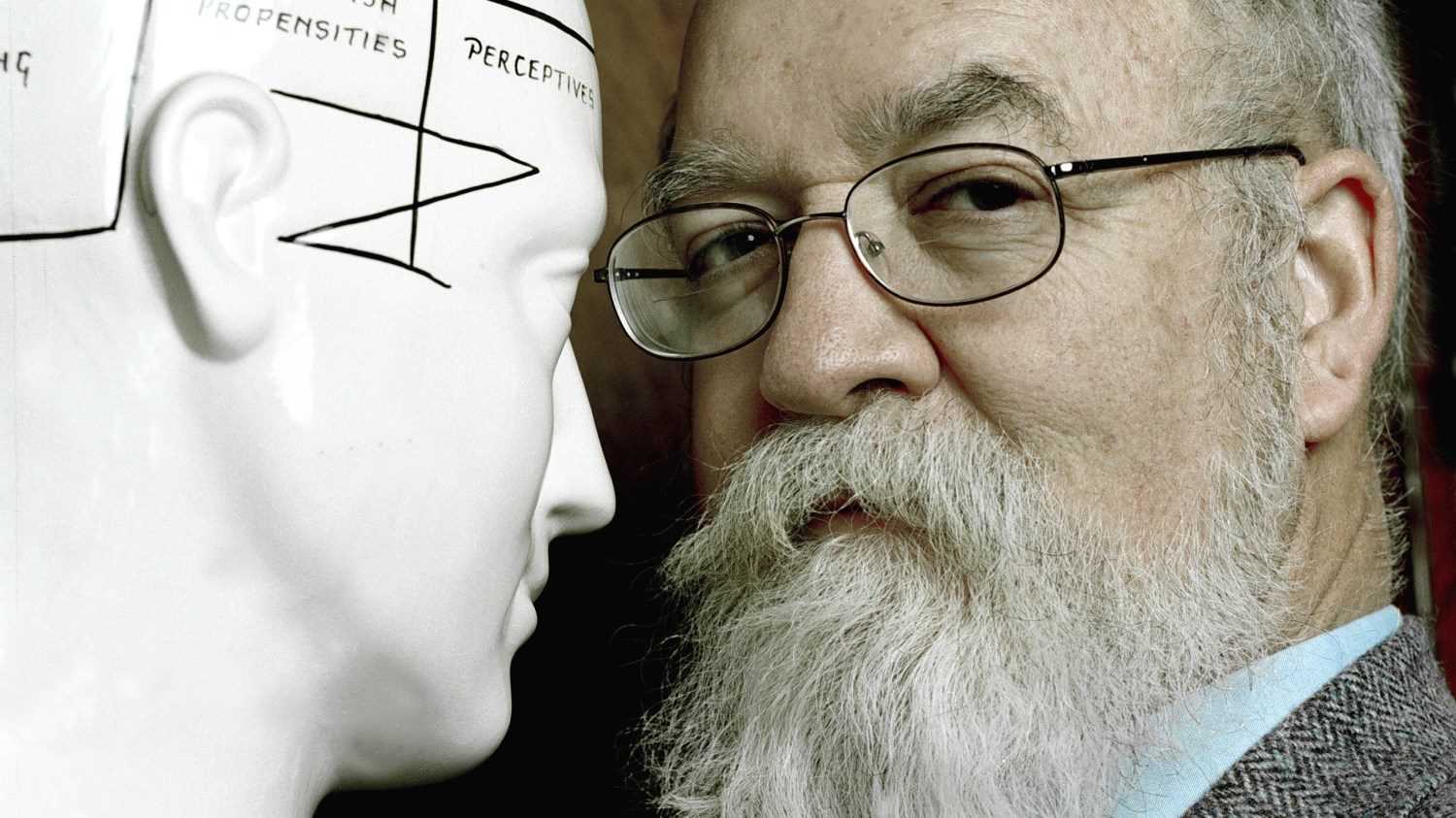| The Meaning of Life |
||
| |
 The Garden of Earthly Delights by
the Dutch painter Hieronymus Bosch, completed
in 1500 (Museo del Prado)
The Normans
used 'Cockaigne' (derived from the Norman word
meaning “sugar cake”) as the nickname
for the bustling city of London – hence
'Cockneys'. However, Cockaigne was originally the
name given to a Utopia especially prominent in
medieval European lore. It was set in a
never-ending month of May, where idleness reigned
and money never ran out, a fountain provided
eternal youth and men and women indulged
unrestrictedly in countless physical delights
without law or morality to spoil the fun. The
descriptions included rivers of wine, houses built
of cake, streets paved with pastry, a sky that
rained cheese and shops that gave away goods to
everyone. Roast geese wandered about inviting
people to eat them, and buttered larks fell from
the skies like manna.Although there had been previous oral accounts, the first known text, the French Fabliau de Cocagne, dates to around 1250. Its 188 verses can be seen as the dream of an earth in which hunger is unknown. But this dream was also a form of protest. Cockaigne’s gourmands were opposed to the Church in particular, but also to the secular authorities, who condemned the deadly sin of gluttony and advocated abstinence and fasting, presumably to imply that the food shortages that were prevalent in those times were required by God. Now, many centuries later, with apps that can deliver meals at the tap of a screen, then from the perspective of a medieval peasant we have come close to achieving their utopia. But if striving for that form of utopia was what gave structure to their lives, then what happens when we achieve it? When AI is doing all the hard lifting and illness and suffering has been conquered, then what would be the point of our existence, our Cockaigne? Would the sins of the flesh be sufficient to keep us satisfied or would we then ask for something more? That is the subject of philosopher Nick Bostrom’s latest book, ‘Deep Utopia: Life and Meaning in a Solved World’. His previous book ‘Superintelligence’ looked at the possibility of an out-of-control artificial intelligence wiping out humanity. But Bostrom is now asking what would happen if, instead, all our physical needs were fulfilled by AI? In my view, a somewhat unlikely scenario for a population of 10 billion. A century ago, economist John Maynard Keynes predicted that technological advances would lead us to work 15 hours a week in the 21st century. That hasn’t happened, but it is certainly conceivable that in a distant future the need to work may be at least substantially reduced for everyone – and not just for pensioners sitting in their riser-recliner armchairs. And, if so, are we then looking at the need finally to decide what we really want out of life – perhaps finally to crack the idea of the Meaning of Life? But what does the phrase ‘the Meaning of Life’ actually connote? After all, the idea has been around since at least the time of the ancient Greeks and so we ought to be getting a handle on it by now. The Hitch-hiker's Guide to the Galaxy famously told us that it was 42, as calculated over a period of 7.5 million years by the supercomputer ‘Deep Thought’ But then Deep Thought had to start again in order to work out the much more difficult puzzle of what the question actually meant. Those however who think the question actually has meaning would probably say, without any clear definition, that it would encompass a description of some ‘higher reason’ as to why we exist. And so it would probably presuppose a spiritual answer, such as being at one with the universe, whatever that may mean. Maybe though we should look at other questions: what is the colour of life or the radius of life? All of them make perfect grammatical sense. The problem is that they make no actual sense, except perhaps when used metaphorically - such as with the expression, ‘the odour of sanctity’. And so although ‘the meaning of life’ is one of the ‘big questions’, we have to look at whether ascribing 'meaning' to life actually makes sense or is simply a category error. Which brings us to the philosophy of the recently departed Professor Daniel  Dennett, friend of
Richard Dawkins and renowned atheist and
philosopher. An illustration of his philosophy
occurred to me when looking at the lawned area at
the front of our apartment here in Annecy. When we
arrived, the grass had just been mown, but within
a few days we had the wild flowers on show again.
Although the lawn looked quite uniform, there were
in fact two or three different species and within
each there were variations in size and colour.
Although they had all followed the rules of
genetics, they were all slightly different. So
then, at first sight, the rules looked a little
frayed around the edges. Dennett, friend of
Richard Dawkins and renowned atheist and
philosopher. An illustration of his philosophy
occurred to me when looking at the lawned area at
the front of our apartment here in Annecy. When we
arrived, the grass had just been mown, but within
a few days we had the wild flowers on show again.
Although the lawn looked quite uniform, there were
in fact two or three different species and within
each there were variations in size and colour.
Although they had all followed the rules of
genetics, they were all slightly different. So
then, at first sight, the rules looked a little
frayed around the edges.  Clearly though the
variations had in fact resulted from marginally
different growing conditions, miniscule changes in
the DNA as a result of UV damage and so on. And so
it is with us. Dennett himself took an
evolutionary view of philosophy. All can be
explained by natural selection between mutations -
our wishes and desires and, even religion itself. Clearly though the
variations had in fact resulted from marginally
different growing conditions, miniscule changes in
the DNA as a result of UV damage and so on. And so
it is with us. Dennett himself took an
evolutionary view of philosophy. All can be
explained by natural selection between mutations -
our wishes and desires and, even religion itself.
Especially religion - which Dennett considered to be a self-replicating meme. One which had had millions of variations most of which had failed to take hold, leaving the religions which are now in place - until they in turn are replaced. He saw the brain as a supercomputer where everything was located, from intelligence and consciousness to the sense of self. He also said that the brain/mind was constantly evolving. It’s certainly capable of doing so granted that there are so many neurotypes (what we used to call personalities) and variations in intelligence in our huge population which can be selected from. So no meaning of life for him. In turn, that leads us to my favourite branch of philosophy, ‘Effective Altruism’, created by the same Nicholas Bostrom. It entails an obligation to do everything possible to promote the existence of the human race - and so is his ‘meaning of life’. It must however be a non-starter. This is not only because of the little difficulty caused by the imprisonment for embezzlement of one of its major financiers, Sam Bankman-Fried, but also because Professor Bostrom’s 'Effective Altruism Institute' at Oxford University has just been closed down. However, the real reason goes a lot deeper. It is because natural selection has a habit of selecting paths we would never have predicted. And as Effective Altruism depends for its ‘effectiveness’ on a very long term view of humanity and what will be good for us, it is by its nature incapable of working. There will be far too many variables available to be selected from. We can therefore never have any confidence that the future which we consider we should promote will be the future that our descendants will consider to be what they want - or would in fact enhance their prospects of survival. So what can we actually say about the 'meaning of life'? Bill Gates has said that, in a post-work future, our biggest challenge will be a “lack of purpose”. And of course, the word ‘purpose’ could be substituted for ‘meaning’, but I’m not sure that works any better in providing us with a single overarching explanation for our lives. We all have different purposes at different points in our lives. As little children we want to grow older more quickly, perhaps encouraged by the prospect of birthday cake, whilst as adults we would prefer time to slow down. As teenagers we have different wants and desires as compared to our somewhat more ‘mature’ selves. As societies we change our wishes and aims not only over millennia and centuries but even from one decade to another. And not only are there different customs in different areas of the world, but the aims and morality asked of us (and our ancestors) by the many religions which exist (and have existed) vary both with the religion and the particular variant of it to which someone subscribes. So then, to believe that there is one true 'meaning' or 'purpose' to life seems a bit irrational. Which I think indicates that there is no great philosophical question to resolve after all. Maybe just get on with doing what we enjoy? Simples! Paul Buckingham 6 May 2024 |
|
|
|